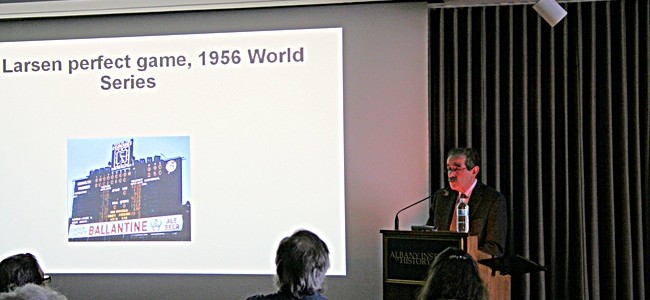Thanks to the Albany (New York) Institute of History and Art, this city is the place to be if you have an interest in baseball. The Institute’s “Triple Play” exhibit on baseball runs through July.
It’s not only the exhibit (containing items from professional and local teams spanning the history of baseball) that’s impressive, but the speaker series that accompanies the exhibit is incredible too
Yesterday, John Thorn, Official Historian for Major League Baseball, gave a wonderful talk about the history of baseball at the Institute. Mounds of snow and an impeding snow storm did not deter the baseball faithful from attending.
Mr. Thorn’s talk offered a survey of the history of baseball. He noted throughout his talk that the imminent demise of baseball has been pronounced several times dating back to the 1800s. But Mr. Thorn made the case that the sport is profoundly adaptable to anything thrown its way.
A love of history and a love a baseball seem to go hand in hand. As Mr. Thorn noted, baseball is the only professional American sport that has an official historian. This suggests to Mr. Thorn that the other professional sports organizations might not “give a damn” so much about their history. This observation was greeted with a round of applause and laughter.
During the question and answer session, I asked Mr. Thorn if years from now we would be looking back at the steroid era with a different view, perhaps even admitting some steroid users to the Hall of Fame. Mr. Thorn thought this would occur and made the case that baseball is a forgiving and inclusive sport. With respect to affixing an asterisk to steroid era players, Mr. Thorn made the point of suggesting that players prior to the 1947 integration of baseball might as well carry one too.
One audience member followed up this comment with a question about Pete Rose. He asked if baseball were a forgiving sport, would it forgive Pete Rose? Mr. Thorn said that while the new Commissioner of Baseball, Rob Manfred, planned to revisit the issue, the problem with Pete Rose is that he is so guilty. Mr. Thorn also pointed out that baseball has a history of banning gamblers and game-fixers from baseball that predates the 1919 Black Sox scandal, going back to the 1800s. It seems that while baseball may be forgiving and inclusive overall, it’s less so when it comes to the issue of gambling given its history and rules.
I also asked Mr. Thorn if Rob Manfred’s proclamation to address youth involvement in the sport of baseball was something new for a commissioner of baseball. He said that it was not. He correctly pointed to Major League Baseball’s RBI (Reviving Baseball in Innner Cities) program, but then he noted something extraordinary, at least to me. Without and prompting, he noted the problem of travel baseball teams and their propensity to create two classes: the “haves” and the “have-nots.” I was impressed with his awareness of this modern day issue involving youth sports as it has nothing to do with history of professional baseball.
Since my novel addresses the travel baseball issue head-on and provides a framework for addressing it, I approached Mr. Thorn afterwards, introduced myself, and offered him a copy of Saving Babe Ruth which he graciously accepted.
The “Triple Play” exhibit will literally put you in the ballpark of the upcoming season and it’s highly recommended for baseball and history fans alike.

